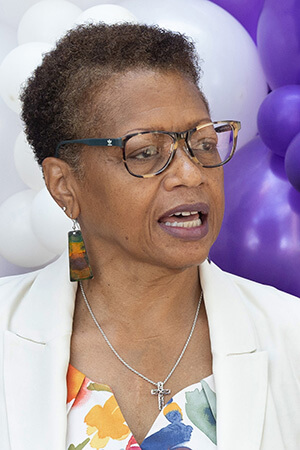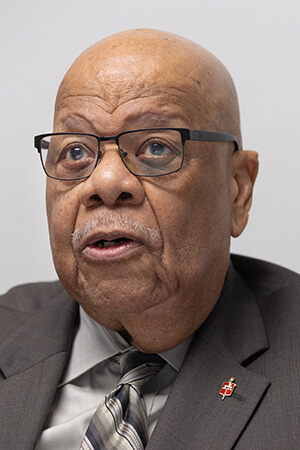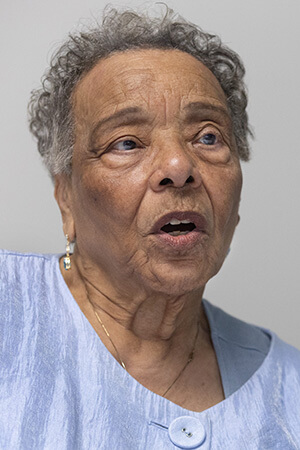Key points:
- Gammon Theological Seminary, the only historically Black United Methodist seminary, is hoping to go from about 20 students to 200 in five years.
- The Rev. Candace M. Lewis, president of Gammon since 2021, plans to wear out her trademark Converse Chuck Taylor high-top sneakers as she travels on her quest to establish partnerships and raise funds.
- The school will offer distance learning with an intensive week each semester on campus.
The day before a low-key Aug. 15 ribbon-cutting for a new student lounge in space previously used to house the bookstore, the rest of the building was still a work in progress.
Brown builder’s paper covered floors, plastic tarp protected walls and furniture and piles of boxes were waiting to be unpacked in unpainted rooms.
Leading a tour of the compact campus, the Rev. Candace M. Lewis injected bright colors and ebullient confidence wherever she roamed. Wearing a multihued dress and her trademark high-top Chuck Taylor Converse sneakers, Lewis clearly saw things — through her large, fashionable, box-shaped glasses — others hadn’t envisioned yet.
“Wherever God gives vision, there’s provision,” said Lewis, president of Gammon since 2021. “We have more than enough vision to go around, and as we share vision, I feel like that really does invoke generosity.”
Lewis and her small staff are reinventing the only historically Black United Methodist seminary with distance learning and seeking new partnerships and sources of funding. Gammon also is now going through the process of getting its own Southern Association of Colleges and Schools accreditation after more than six decades of having it through the Interdenominational Theological Center.
The ITC, a consortium of historically Black schools, declared financial exigency in April of 2023, indicating a severe financial crisis. In response, Gammon opted to go its own way. The ITC includes Morehouse School of Religion and schools associated with the Christian Methodist Episcopal Church and the Church of God in Christ. Turner Theological Seminary, an African Methodist Episcopal Church seminary, has also pulled out of the ITC. The United Methodist Board of Higher Education and Ministry helped out with a $350,000 grant to Gammon after the exigency was declared.
“I didn’t anticipate the crisis of exigency,” Lewis said. “That just felt like the bottom was falling out of the school. But what I learned in that process is that in every crisis, there’s an opportunity.”
Because of the declaration of exigency, Gammon was forced to transfer all of its students to other institutions to finish their degrees, which Lewis said was “the lowest point.”
“So we had to settle down and be prayerful,” she said. “Ask the Lord, ‘What is the opportunity in this crisis?’ So now, 18 months later, we’re getting ready to launch as an independent school.”
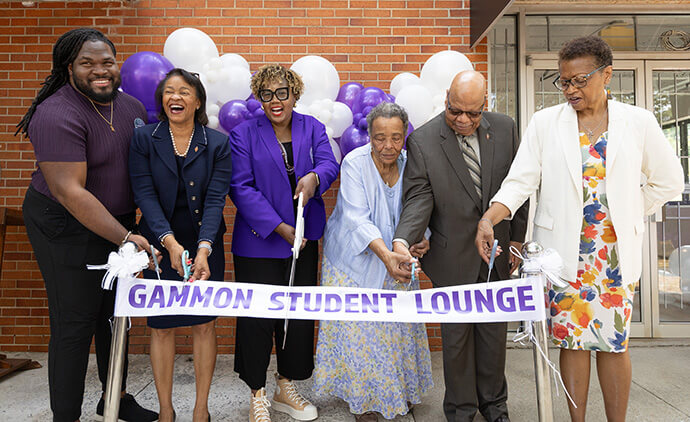
The Rev. Renita Weems, a respected biblical scholar, teacher, theologian and author, has come aboard as chief academic officer, a position the ITC used to provide.
“I’ve been hired to begin to shore up the academic side of the school — the faculty, the curriculum and student assessments, all of those,” Weems said.
Reviving Gammon is helped by the school’s rich history and success producing Black clergy and leaders for The United Methodist Church, she said.
“There are students — United Methodist but also non-United Methodist — who are interested in attending a historically Black theological institution and would appreciate it being one of maybe three that are online across the country,” Weems said. “So I think there’s a market.”
Lewis said she is confident that by the time the new fall class graduates, the Southern Association of Colleges and Schools accreditation will be secured.
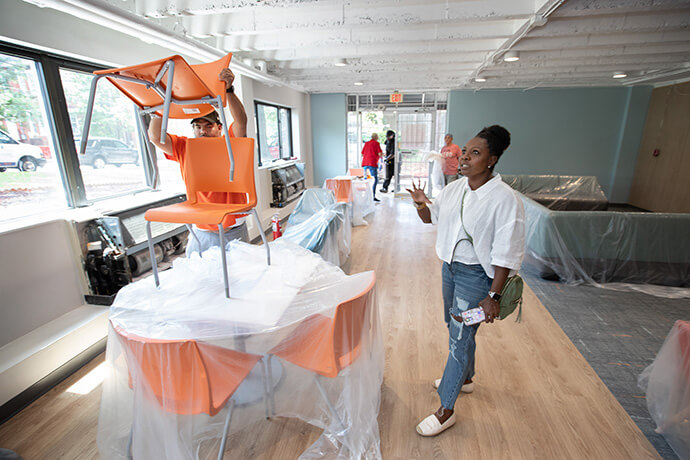
Along with leaving the ITC, Gammon — like the other 12 U.S. United Methodist seminaries — is getting less support from the denomination’s Ministerial Education Fund due to a reduced budget and the disaffiliation of about a quarter of U.S. churches over how inclusive to be of LGBTQ people in the life of the church. The denomination’s General Conference recently removed bans on gay clergy and same-sex weddings.
Subscribe to our
e-newsletter
From 2016 to 2023, The United Methodist Church scaled back its support of Gammon by nearly half, from $728,034 to $367,513, according to the United Methodist Board of Higher Education and Ministry. Gammon gets the least support of the 13 United Methodist seminaries in the U.S., primarily because the number of students and ordinations are large considerations in the funding formula. For the fall semester, Gammon has about 20 students, Lewis said.
Candler School of Theology at Emory University, also based in Atlanta, got nearly $1.2 million from the denomination in 2023. Candler enrollment for the 2023-2024 academic year was 419, according to Candler spokesperson Claire Asbury Lennox.
“I think (the funding formula) has to be changed if Gammon is to remain one of the 13 (U.S. United Methodist seminaries),” said retired Bishop Alfred L. Norris, former president of Gammon. “We are always smaller. … We’re not economically as strong because of our size and because of history in the United States. There has to be some attention given to the fact that we are still a viable seminary in The United Methodist Church, and therefore we need more support from the church because we can’t get the kind of support from other sources that we need.”
In a statement, Roland Fernandes, top executive of the United Methodist Board of Higher Education and Ministry, said “anticipated budgetary changes will be a major adjustment for all of the UMC’s work.
“It is too soon to commit to any changes in the disbursement of the Ministerial Education Fund,” he said.
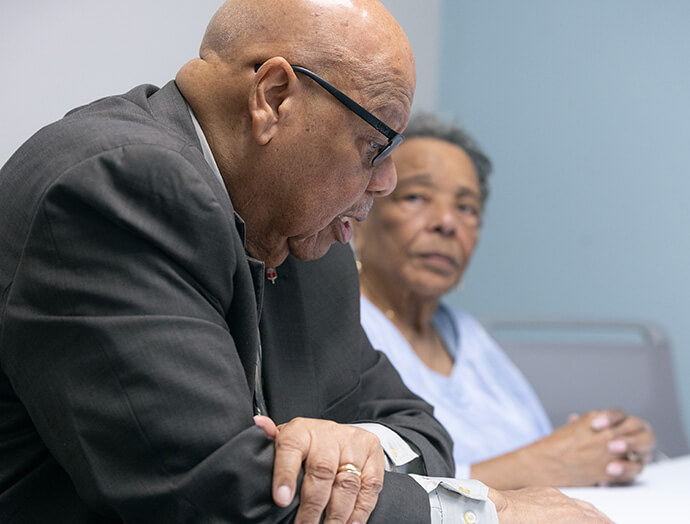
Lewis estimates Gammon has three to five years to raise enough money to make Gammon self-supporting. A big part of the president’s job is seeking partnerships and contributions to get there.
“In our Gammon 2030 strategic plan, we anticipate raising several millions of dollars,” Lewis said. “We anticipate growing our student enrollment and we anticipate growing our annual giving campaign.”
A multimillion annual fund campaign is being prepared to launch in the fall of 2025 or spring of 2026. The monetary goal has not yet been set.
Lewis believes she is the right person for the Gammon job, as a change agent with an established record.
“If you look at my ministry track record, I’ve always been an innovator,” Lewis said.
“The Florida Conference hadn’t started a new African American church in 20 years,” she said. “So right out of seminary, that was my first appointment to start a church. That church is 27 years old, and it’s still going.”
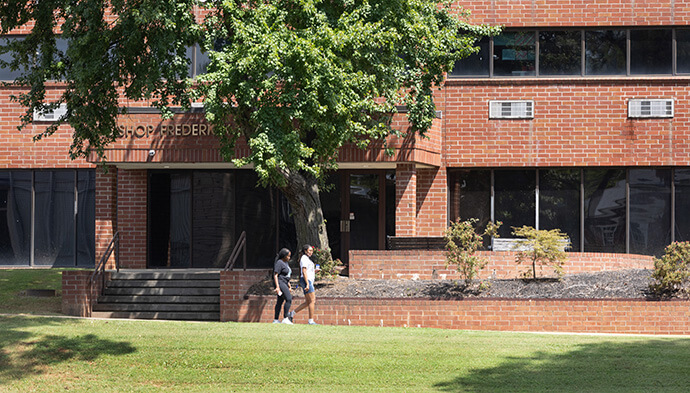
Lewis also worked for Path 1, a branch of United Methodist Discipleship Ministries that innovates and equips church leaders to start and sustain new and vital congregations and ministries.
“I started out as a staff person, then I became an executive director and then I went to lead the largest district in the Florida Conference (as a district superintendent),” Lewis said.
Now she is back at Gammon, her alma mater.
“The school really needed a type of leader that could give them more options related to their future, and I’m gifted in visionary, transformational leadership,” she said.
Here are some of the changes so far:
- Gammon will offer a hybrid delivery of in-person and online distance-learning, with students visiting the campus each semester. This will allow the school to attract students who don’t want to or can’t afford to move to Atlanta. “We’re going to offer a hybrid model, where students will come to campus for an intensive, one full week each semester,” Lewis said.
- Since the distance-learning strategy will make 51 units of housing available, Gammon has partnered with Spelman College, a historically African American undergraduate institution for women less than a mile from the Gammon campus. Housing revenue for Gammon will increase significantly due to this partnership, Lewis said.
- By next year, an online certificate program will be launched for people who want to learn for the sake of learning, or pastors looking for continuing education in an aspect of ministry such as womanist theology, liberation theology or how to be more inclusive.
- The Florida Conference has raised $100,000 for an endowed scholarship at Gammon in the name of the Rev. Geraldine McClellan, the first Black woman ordained in the Florida Conference.
- A center for Latino/Latina theological studies is being planned, possibly for launch in January, to serve the fast-growing Spanish-speaking population. “Our approach is going to be probably different from some of the other theological schools’ approach because our approach is really about training Latine people in the work of justice and liberation,” Lewis said.
- Gammon would be interested in taking over church property that isn’t being used. “We would love to partner, let’s say, with the North Georgia Conference,” Lewis said. “If they would give us an old church, we could renovate that space and we could create an innovative model of what a seminary could look like in 2024.” The current campus, which Gammon owns, could still serve as the home for administrative work.
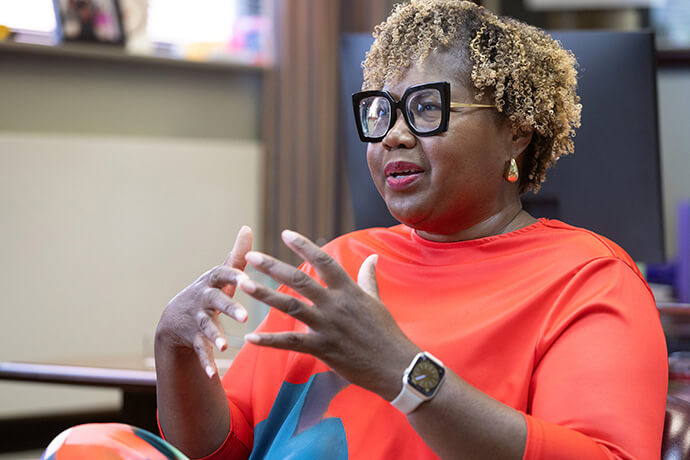
Gammon is looking to hire two more faculty members and part-time adjunct faculty in the next year, Lewis said.
“We’re building what we believe is going to be a stellar faculty to really relaunch ourselves to the denomination at a (good) time,” Lewis said. “Based on many of the decisions that were made at General Conference around being a more inclusive church, being a more justice-focused church and being a more justice-oriented church, our denomination needs a school with a proven track record of raising up and training prophetic leaders and pastors and we need a school that has a prophetic voice and a voice of liberation and justice.
“I feel like Gammon is needed now more than ever before. Our commitment to train leaders to be just and generative in the world is needed now more than ever.”
The number of students could grow to 200-250 in five years, Weems said.
“We can start with a handful in the very beginning and each semester we expect to grow,” she said. “We do know that there are students who are interested in the one school within the United Methodist system that is a historically Black theological institution.”
Even on a celebratory day, Lewis continued to look ahead with ambition.
“I would love to offer every student 50% tuitions based on scholarship money that we have raised,” she said. “So I’m going to be hitting the streets hard this fall.
“That’s why I got my tennis shoes on, because I’m going to do a lot of running, a lot of walking, because I got to build some strong partnerships.”
Patterson is a UM News reporter in Nashville, Tennessee. Contact him at 615-742-5470 or newsdesk@umnews.org. To read more United Methodist news, subscribe to the free Daily or Weekly Digests.
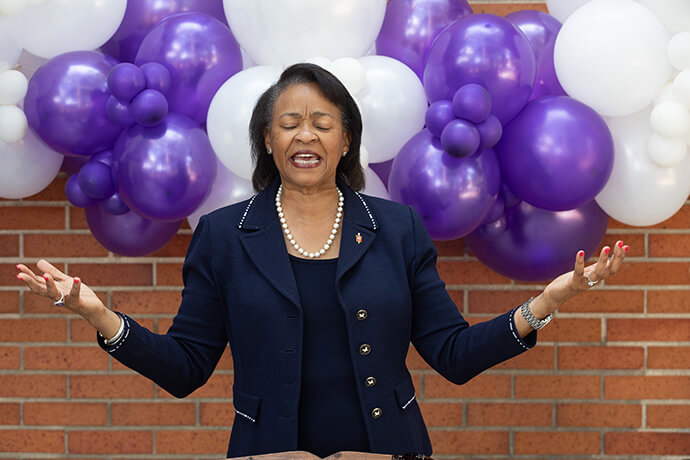
Additional praise
At a ribbon-cutting Aug. 15 for the new student lounge at Gammon Theological Seminary, alumni and United Methodist church officials sang the school’s praises.
